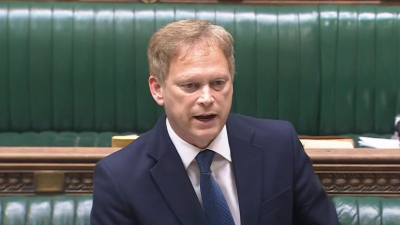Sunak's Pledge: Benefits Cut for Long-Term Job Seekers
In a bold move to overhaul the welfare system, Chancellor Rishi Sunak has vowed to strip benefits from individuals who, despite being deemed fit for work, refuse job offers for over a year. Sunak's proposed reforms, set to be implemented should the Conservatives secure victory in the upcoming general election, aim to redefine unemployment support as a safety net rather than a lifestyle choice.
Addressing the nation, Sunak emphasized the ethos of rewarding hard work, declaring, "Unemployment support should be a safety net, never a choice." He underscored the government's commitment to assisting individuals back into employment, asserting a firm stance against what he termed as 'sick note culture.'
Outlined measures include tightening the work capability assessment, expecting individuals with less severe conditions to actively seek employment. Additionally, Sunak proposed a review of the fit note system, shifting focus towards assessing individuals' capabilities rather than limitations, a task to be undertaken by independent assessors.
Among the proposed changes is the enforcement of stricter rules for those working less than half of a full-time week, mandating them to actively pursue additional work opportunities. Sunak also announced a consultation on Personal Independence Payment (PIP), exploring eligibility adjustments and targeted support alternatives.
Highlighting the gravity of benefit fraud, Sunak proposed the introduction of a new fraud bill, equating benefit fraud to tax fraud and empowering authorities with enhanced seizure and arrest capabilities. However, he reassured that the reforms are not intended to diminish the generosity of the benefits system but rather to ensure it effectively meets the needs of the deserving.
Critics, including Labour and disability charities, have raised concerns over the potential ramifications of these reforms. Labour attributed the rise in unemployment to the Conservative government's mishandling of the NHS, while disability advocates deemed the measures as "dangerous.
Sunak's proactive stance against 'sick note culture' reflects a broader government agenda aimed at revitalizing the workforce and fostering a culture of self-sufficiency and responsibility.
Sunak's Plan: GPs to Lose Sick Note Authority
In a significant announcement today, Prime Minister Rishi Sunak revealed plans to strip General Practitioners (GPs) of their authority to issue sick notes if his party secures victory in the next general election. Instead, he proposed that "specialist work and health professionals" would take over this responsibility in England, citing concerns over the alarming number of 2.8 million younger individuals currently unemployed.
While Sunak's diagnosis of the problem emphasizes the need for action, critics question whether it's addressing the root cause. Official figures from the Office for Budget Responsibility (OBR) indicate a relatively stable number of sick notes issued over the past four years, with fluctuations primarily attributed to lockdowns. However, a notable increase in economic inactivity, particularly due to long-term ill health, underscores broader challenges in workforce participation.
Tony Wilson, Director of the Institute for Employment Studies, argues that while sick notes play a role, the focus should be on facilitating reintegration into the workforce for those already unemployed. Despite assertions that current sickness benefit levels are unsustainable, Sunak's insistence on expecting individuals with mental health conditions to work has sparked debate. While acknowledging progress in destigmatizing mental health discussions, concerns arise over the expectation for individuals experiencing anxiety or depression to actively seek employment.
Contrary to Sunak's statements, Louise Murphy from the Resolution Foundation highlights that while many Personal Independence Payment (PIP) claims among young people pertain to psychiatric disorders, they often involve long-term conditions like ADHD and autism rather than short-term issues like anxiety and depression.
Critics also point out a glaring omission from Sunak's address: the state of NHS mental health services. NHS leaders have warned of overwhelmed services struggling to meet the rising demand for post-COVID mental health support, raising questions about the government's comprehensive approach to addressing mental health challenges.
Sunak's Vision: A Call for Action on Economic Inactivity
With promises for detailed plans in the next parliamentary session and consultations on the horizon, the government is poised to unveil further legislative steps to address mounting economic inactivity. Recent data from the Office for National Statistics (ONS) underscores the urgency of the situation, revealing that a staggering 9.4 million individuals aged 16 to 64 are deemed "economically inactive," with over 2.8 million attributing long-term sickness as the primary cause.
Prime Minister Sunak highlighted the concerning rise in individuals being signed off due to long-term sickness since the onset of the COVID-19 pandemic, with a notable proportion reporting depression, particularly among young people. He emphasized the significant financial burden, noting a substantial increase in spending on benefits for individuals with disabilities or health conditions, surpassing the entire budget allocated for schools or policing.
Asserting his commitment to acknowledging the realities of mental health challenges, Sunak underscored the need for proactive measures rather than complacency in the face of adversity. While recognizing the potential criticism of lacking compassion, he defended his stance, emphasizing the necessity of challenging the status quo to prevent a generation from succumbing to inertia and dependency.
However, opposition voices, notably Labour, attribute the root cause of economic inactivity to the Conservative government's mismanagement of the health service. Acting Shadow Work and Pensions Secretary Alison McGovern criticized Sunak's proposals as insufficient, highlighting the pressing need for concrete solutions to facilitate workforce reintegration amidst record NHS waiting lists and a burgeoning benefits bill.
As the debate intensifies, Sunak's call for change resonates as a rallying cry for decisive action to revitalize the economy and empower individuals to seize opportunities for meaningful employment.
Critics Slam Sunak's Speech as Divisive and Harmful
Liberal Democrat leader Sir Ed Davey didn't mince words, labeling Prime Minister Sunak's address as "desperate" and accusing him of attempting to deflect blame onto the British people for the government's economic and NHS shortcomings. Davey's scathing critique echoed sentiments of many who viewed Sunak's speech as a feeble attempt to absolve his administration of responsibility.
Disability charity Scope also condemned the proposed measures, deeming them a "full-on assault on disabled people" with potentially dire consequences. James Taylor, the charity's director of strategy, expressed grave concerns about the impact of the reforms, warning that sanctions and benefit cuts could exacerbate the struggles of those already grappling with the mounting cost of living crisis.
As dissenting voices grow louder, Sunak's proposals face mounting scrutiny, with critics condemning them as divisive and harmful rather than constructive solutions to address societal challenges.
In conclusion, Prime Minister Sunak's proposed reforms to overhaul the welfare system have sparked intense debate and drawn sharp criticism from various quarters. While Sunak emphasizes the need for proactive measures to tackle economic inactivity and bolster workforce participation, critics argue that his proposals risk exacerbating inequalities and leaving vulnerable populations in precarious situations. As the discourse intensifies, it becomes increasingly evident that any meaningful reforms must prioritize empathy, inclusivity, and evidence-based policies to truly address the complex challenges facing society. Only through concerted efforts and genuine dialogue can we hope to forge a welfare system that upholds dignity, fairness, and opportunity for all.







